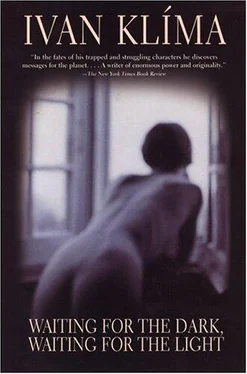'I just did it the way I always do. I can't control the expressions on people's faces.'
'It depends on who you shoot, and when.'
'There are faces you could look at for a year without ever seeing an intelligent expression.'
The boss laughed drily. 'Did you hand in all the tapes?'
He shrugged his shoulders.
'I know, it doesn't matter a damn. They had their own cameramen there anyway. I saw that video journal of theirs. Pretty soon we'll have two news broadcasts, two governments and two countries in one. Unfortunately, their video journal is better than ours. Not technically. But at least there's something to look at.'
'I could do that too.'
'Of course you could,' said the boss, 'if I didn't get in your way. Maybe you should work for them. It will count in your favour one day.'
'I don't need anyone to count anything in my favour,' he said angrily. 'Either I'm recognized for what I can do, or they can shove it.'
Halama had stopped listening. He rummaged through some papers for a while and then said, 'It looks as though they're going to loosen up, let us show more things now. Get some ideas together, put them on paper and we'll see.'
What is or is not allowed on television is mainly decided by Halama himself, Pavel thought. But he's only one card in a house of cards. Like me. One card goes and the whole house collapses. Doesn't he know that?
'I've got lots of ideas.'
'So, put them down on paper for me and submit them.'
'I think I'll wait a bit.'
'If you're sure they won't get stale.'
'Maybe just the opposite.'
'By the way, you're doing that meeting in the chemical factory. Think about what I've said. And if they get into a real discussion, try not to scare them. And since you're going to be there anyway, I've heard that people's lives are at risk in the aniline dye plant.'
'All our lives are at risk.'
In the flat he had been coming to for the past two years as if it were home, the woman to whom he behaved as though she were the mother of his son, although the real father lived behind the door next to their bedroom, was waiting impatiently for him. The boy was ill. He had a fever, and she couldn't get through to the emergency clinic on the phone.
'All right, I'll take him.'
'Are you sure you wouldn't mind? I don't know what else I can do.'
The boy lay in his room, his face flushed with fever. He tried to smile. 'We're supposed to be playing the last game of the season tomorrow.'
'You'll play in a lot of games yet,' he reassured him. 'What kind of an idea is this, to get so ill?'
'I must have got a chill during practice.'
'It's rotten weather,' Pavel said. 'And there's more crap in the air than a body can stand.'
As it turned out, the emergency clinic had a new telephone number (she might have thought of calling information), and the doctor had just gone out on her rounds. Robin's teeth were chattering with the fever, so he drove him to the hospital to save time. The hospital emergency ward was empty, and the nurse went to call a doctor. The boy sat leaning against his mother's shoulder. Eva stroked his damp hair. She clearly loved the boy, but what was her relationship with Pavel?
He was a man who slept with her and brought her money. He was a man who brought her money, and for that was allowed to sleep with her.
Whom did he love?
His father was dead and his mother was becoming a wooden puppet.
Where was Albina now? She might be only a few steps away. He'd have to walk over to the wing of the hospital where she worked. 'I'll wait in the car,' he said to Eva.
'You'll be cold.'
'I don't like hospital waiting-rooms. I'll turn the heat on in the car. Then at least we'll be warm on the way back.'
He would have time to go to the surgical wing. He would open the door, enter the brightly lit corridor and wait until the nurse came.
'Are you looking for someone?'
'I wanted to ask — a while ago there was a nurse working here, Valentová. Albina Valentová.'
'Albina? No, I can't say. I haven't been here long.'
'Of course, it was quite a few years ago. She must have left long ago. I just thought someone here might know where she was now.'
'Our matron might know. Or you could ask in the personnel department tomorrow. They should be able to help.'
'Thank you. I'll do that.'
Next day, in the cottage, it was still raining. 'I understand you,' she said suddenly over breakfast. 'When I was little and I'd done something wrong, Mother locked me in a cupboard in the basement.'
'Was that in India?'
'No, we were back home again by then. It was an
ordinary cupboard, but there were all sorts of bottles on the shelves and they seemed to be giving off light. I was terrified of those bottles. And I was afraid that a headless knight or some other ghost might burst into the room. I was too ashamed to shout but I cried and waved my arms to frighten the spirits away. Then I got the idea of closing my eyes and imagining that I'd escaped and was outside, in the garden, or the park.'
'It's good when you make up your mind to escape.'
'I could only do it in my head.'
'Could you do that now?'
'But I'm happy to be here with you.'
'We could run away together.'
'If you want. If it's too claustrophobic for you here.'
'What country would you choose?'
Eva and the boy came outside. 'It's pneumonia.' Eva looked terrified. 'We've got some antibiotics.'
'You'll be fine in a couple of days,' he said, stroking the boy's hair.
'You're so kind to us,' she said while he was driving back to the place he happened to be living in at the moment. 'We'll never forget this.'
3
One of the managing directors was waiting for them outside the main gate. The television vehicle couldn't go inside the factory grounds yet, he announced apologetically. The exhaust first had to be fitted with a protective wire mesh. Meanwhile, they could have a tour of the plant in his car. He could show them what they might eventually film, but he had to warn them that this amounted to practically nothing because practically everything was secret.
'We'll find something interesting,' Pavel said and he introduced his assistant, a man everyone called Little Ivens.
The iron gates were rusty, and a layer of white dust covered the ground. There was a sharp, acrid smell of ammonia in the cold air.
The manager opened the door of his car for them and warned the film crew that smoking was strictly forbidden throughout the plant. He hoped their cameras didn't give off sparks, he said with a dry laugh, and that their lamps would not explode. 'You know,' he said, waving his hand in the thick, stinking atmosphere they were breathing, 'sometimes all it takes is a spark.'
The manager was a man with a greyish complexion who tried hard to be jovial. He was a smoker and must have been miserable in a place like this. When they got into his car, he changed the subject to the reason he assumed they had come. They were being asked to elect a new executive director at the meeting, but everyone here felt that the old management team should be kept on despite the reforms. A large and important enterprise such as this one should be run by experts, after all. Of course there was a lot that needed changing. The equipment was antiquated, but that was not the management's fault. The enterprise had to pour money that might have been used to build a modern production line into the state coffers, and once the state got hold of the money, it simply evaporated, or rather got swallowed up by palaces of culture and power dams that did more harm than good… He stopped as though he had suddenly realized he didn't know who he was talking to, or rather, as though he knew exactly who he was talking to.
There were still two hours before the meeting began. On television, meetings were as boring as heads of state receiving ambassadors or saying goodbye to each other at airports. Unfortunately, this was precisely the kind of thing news producers wanted. They didn't care if viewers were bored or not. They knew that most people had no choice of programme and that they would look at the screen even if all they showed was smoke pouring out of smokestacks. Sometimes there were interesting faces at these meetings, but they were the exception, and they almost never belonged to the person who was speaking. The speakers usually had oddly shaped heads and spoke in slippery sentences. In the cutting-room Pavel's colleagues would often try in vain to find a single sentence that actually meant something.
Читать дальше











